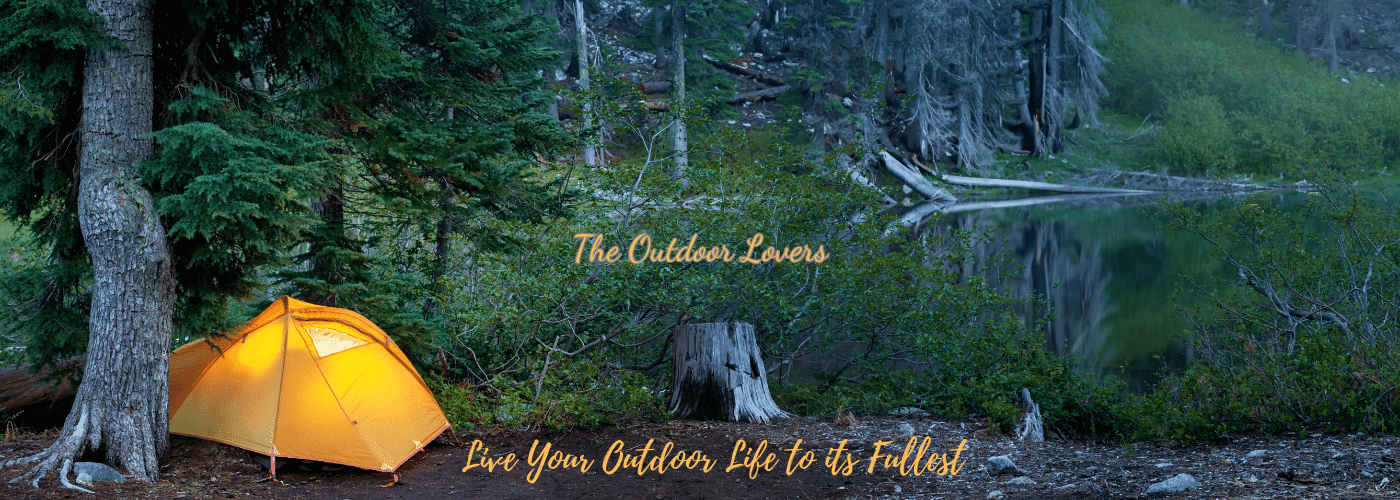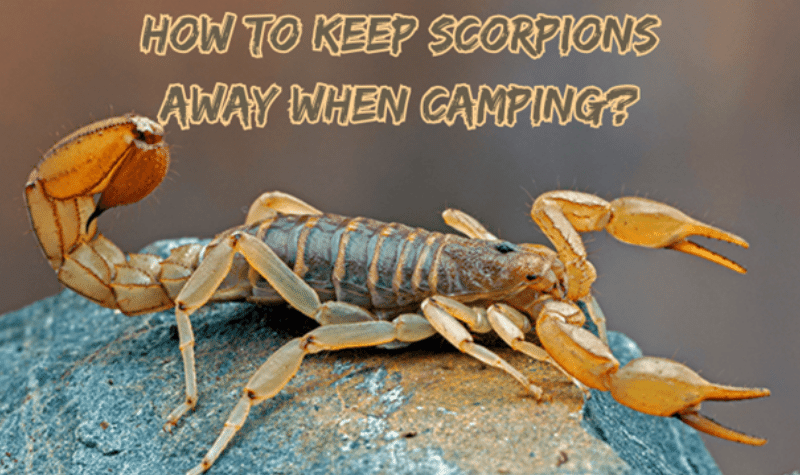Camping in the wilderness may be an amazing experience, but it sometimes comes with unexpected animal encounters, including scorpions. With their deadly stingers, these arachnids can pose a problem to campers looking for a safe and pleasurable vacation.
Understanding scorpions, their behaviour, and efficient ways to avoid them is critical for a worry-free camping experience. This article will discuss scorpions, their control methods, and how to keep scorpions away when camping.
Whether you’re an experienced camper or a first-time adventurer, this thorough guide will give you the knowledge and confidence to make your camping trip scorpion-free.
How To Keep Scorpions Away When Camping?
Understanding Scorpions
Scorpions are fascinating arachnids that campers may encounter in various outdoor situations. They have different traits, both in anatomy and behaviour. In general, scorpions have segmented bodies that consist of a cephalothorax, a pair of huge pincers called pedipalps, and an extended abdomen.
Their most distinguishing characteristic is the curved, deadly stinger at the tip of their tail, largely employed for self-defence and prey capture.
Scorpions come in various sizes, with some species reaching less than an inch and others exceedingly more than 8 inches. Their colour can vary from mild yellows to dark browns or blacks, helping them blend well with their environment.
Regarding behaviour and ecology, scorpions are mostly nocturnal species, preferring to hunt and travel at night. They show adaptation to a wide range of environments, including deserts, woodlands, grasslands, and caverns.
Still, they are most frequently associated with dry environments. Scorpions are opportunistic predators that eat insects, spiders, and small mammals. Furthermore, they are solitary creatures that exhibit territorial behaviour and seldom tolerate the presence of other scorpions in the vicinity.
North American campers can come across Bark Scorpions, Arizona Giant Hairy Scorpions, Striped Bark Scorpions, and even the non-native Emperor Scorpion. Campers in scorpion-prone areas must understand these fundamental traits to stay attentive, take measures, and keep scorpions away.
Research and Preparation:
Thorough study and preparation are necessary before starting a camping trip, particularly in locations famous for scorpion abundance, to guarantee a safe and pleasurable experience.
It is critical to understand the area’s fauna and any threats. Campers should be mindful of the presence of Scorpions. Knowing the different varieties of scorpions in the region and their behaviours will help you take the necessary precautions.
Research can also give information on scorpion activity levels at various seasons, allowing you to plan your trip properly. Use camping forums, websites, and park or wildlife management agency info to learn from other campers and specialists.
Seek out local expertise by chatting with people or park rangers who may give useful information on scorpion activity and safety practices.
Pack important scorpion-repelling equipment while camping in scorpion-infested regions. One example is sealable containers for food storage to keep scorpions out of your supplies. A flashlight or headlamp for vision at night enabling you to locate scorpions near your tent.
A good pair of hiking boots to save your feet against stinging. Wear long pants and socks to build a physical barrier against scorpion contact.
Dress properly for the occasion. Put on long-sleeved shirts and long pants to protect your skin. Consider using gaiters or leg covers for further protection. Choose a tent with a tightly woven, fine-mesh, and long-lasting floor to keep scorpions out.
When camping in areas with extremely toxic scorpions, it’s a good idea to have a first-aid kit that contains antivenom, particularly if medical services are far away. If required, learn how to administer antivenom and obtain training if it is available.
Choosing the Right Campsite
Choosing the right campground reduces your chances of encountering scorpions when camping. Here are some things to think about while picking a campsite:
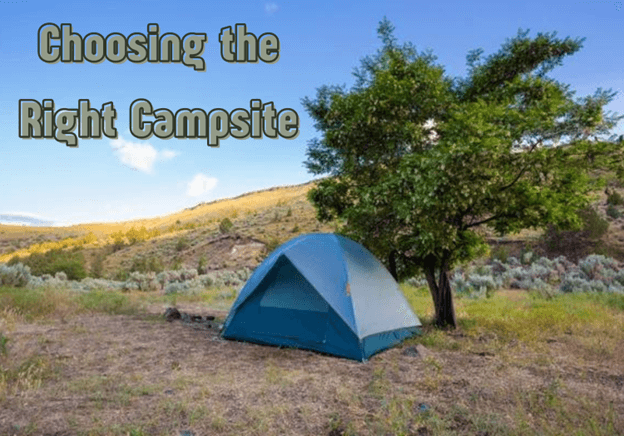
Avoiding Scorpion Hotspots:
Investigate scorpion activity in the vicinity and avoid camping in scorpion hotspots. Consult local knowledge, park rangers, or online resources to discover scorpion-free zones.
Avoid rough terrain because scorpions often take refuge in cracks and beneath rocks. Camping in such settings raises the possibility of encounters.
Distance to Water Sources:
Scorpions are drawn to water sources, particularly in dry areas—Camp safely from bodies of water like rivers, ponds, and lakes. Set your campsite away from stagnant water since this might attract insects, which can attract scorpions.
Enough Lighting:
A well-lit campsite helps prevent scorpions, which are nocturnal critters that love darkness. Use LED lanterns or bonfire lights to illuminate your campground in the evening. Bright white lights should be avoided since they attract insects.
Check Campsite Features:
Examine your selected campsite for scorpion hiding places. Look for scorpions hiding behind rocks, logs, or garbage. Remove such stuff from your camping area. Identify any holes or tunnels in the ground that might be scorpion nests.
Elevation and Terrain:
Because scorpions are more abundant in low-lying desert locations, consider camping at higher altitudes. Choose a campground with a hard, sandy, or gravelly surface above soft, loose dirt, where scorpions may readily burrow.
Distance from Vegetation:
While scorpions are not normally linked with vegetation, keeping a fair distance from tall grass, bushes, or thick underbrush is recommended since these areas can contain insects that scorpions feed on.
Clearing the Area:
Before assembling your tent or campground, properly check the ground and remove any debris or things that might give scorpions in hiding places.
These features and careful campsite selection may greatly limit scorpion encounters and make camping safer and more pleasurable.
Setting Up Your Camp
Set up your campsite using this step-by-step approach while keeping scorpions in mind:
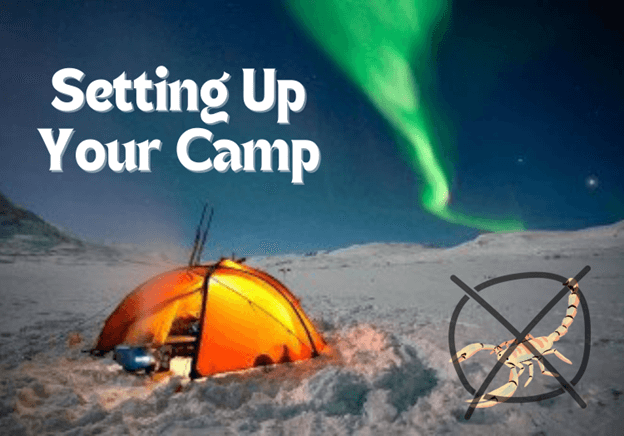
Proper Tent Placement:
Choose a level and high place away from rocky terrain, slow water sources, and thick vegetation for your tent. Avoid putting your tent directly on soft or loose soil since scorpions may readily tunnel through it.
Seal Entry Points:
Inspect your tent for any gaps, holes, or rips that scorpions may exploit to get in. Repair any damage as soon as possible. You may prevent scorpions from entering your tent by sealing the zippers and seams with waterproof sealant. To further decrease the chance of scorpions entering from below, use a ground sheet or footprint underneath your tent.
Keep Food and Trash Secure:
Keep all food and food-related products in airtight and sealed containers to keep scorpions and other pests out. If camping where scorpions and bears coexist, use bear-resistant food canisters, or hang food bags in authorized bear-proof containers.
Garbage should be properly disposed of in sealed garbage bags and containers. Leave no rubbish near your campground since it might attract scorpions.
Organize Your Campsite:
Maintain a neat and clutter-free campground. Keep gear, clothes, and equipment in sealed bags or containers when not in use. Avoid leaving anything on the ground that might serve as scorpion hideouts.
Nighttime Precautions:
Shake clothes and shoes before wearing them at night to ensure no scorpions are within. To explore your campground at night without attracting scorpions, use a torch or headlamp with a red LED light.
Maintain a Clean Campsite:
Sweep and clean your campground area regularly to eliminate dirt and possible scorpion-hiding areas. To deter scorpions from reaching your campground, keep it clean.
Keep Boots and Gear Elevated:
Store your hiking shoes and belongings on raised surfaces like a table or platform to keep scorpions out.
Campfire and Lighting
During your camping vacation, lighting is essential for scorpion protection. Properly regulated lighting can discourage scorpions and reduce the likelihood of encounters. When using a campfire, ensure it’s controlled securely inside a fire ring or approved fire area. This prevents scorpions from crawling into the flames or coming too near.
Many campsites have specific fire rings or campfire places. Use them whenever possible since they are intended to improve safety while minimizing environmental effects. If you must build your fire pit, adhere to the Leave No Trace rules, and place it away from your tent and campground.
Scorpions are drawn to specific light colours, and red or amber LED lights are ideal for nocturnal lighting. Red or amber lighting is less likely to attract insects, lessening the possibility of attracting scorpions that feed on insects. Use red or amber LED headlamps, lanterns, or string lights to add ambient light around your campground.
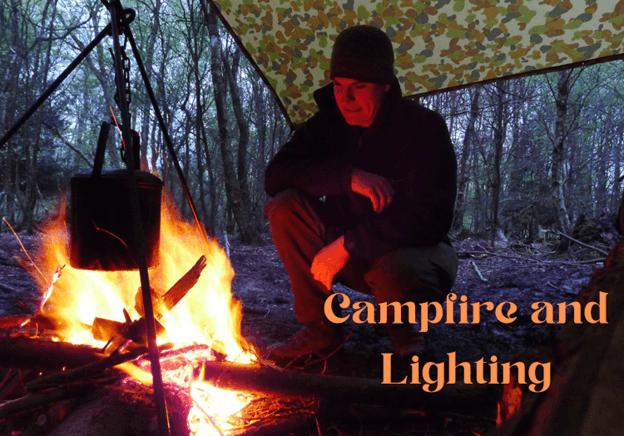
Personal Protection
When camping in scorpion-infested zones, taking precautions is essential to avoid scorpion stings. Use long-sleeved shirts and long trousers to cover your skin, particularly in the evenings and when scorpions are most active.
Wear gaiters or tuck your jeans into your socks to establish a physical barrier against scorpion contact. Wear well-fitting clothes to decrease the possibility of scorpions creeping inside.
Examine your shoes and clothes for scorpions and other insects before putting them on. Shake your clothes to check for any concealed scorpions. Gloves, socks, and shoes are common hiding places for scorpions, so be alert.
Wear gloves while gathering firewood or removing trash around your campground to protect your hands from scorpions. Scorpions may hide behind rocks, logs, or fallen leaves, so handle these things carefully.
Give your sleeping bag or blanket a vigorous shake before going inside to expel any scorpions that may have gotten inside. Take extra care with this step, especially if you’ve left your bedding unattended throughout the day.
While insect repellent is not meant to discourage scorpions, it may help keep other insects that scorpions eat away from your campground. As an added precaution, apply insect repellent to exposed skin and clothes.
Campers may lessen the possibility of scorpion encounters and getting a severe sting during their camping vacation by implementing these personal safety precautions.
Campsite Maintenance
Maintaining your campsite is a continuous effort that may help keep scorpions at bay throughout your camping experience. Inspect your campground every day, both throughout the day and before sleep.
Look for scorpion activity indicators such as tunnels, trails, or scorpions. Ensure your tent, stove, kitchen, and storage spaces are all secure.
Remove any garbage, logs, rocks, or other clutter from your campground that might provide scorpions with a hiding place. Keep the area surrounding your tent tidy and free of possible scorpion traps.
Clean your kitchen area, tools, and dishes thoroughly after each meal. Dispose of food waste and clean cooking equipment as soon as possible. Keep all food in tightly sealed containers to keep scorpions and other animals away from your campground.
Remove objects that might attract scorpions or other pests, such as open food containers, garbage, or dirty dishes. Keep all garbage in airtight, smell-proof containers beyond your sleeping bag.
Learn about scorpions, their behaviours, and how to recognize them for yourself and your camping friends. Encourage everyone in your organization to be on the lookout for scorpions and to report any sightings or concerns.
These regular campsite management procedures may make your camping vacation safer and more scorpion-resistant, minimizing the risk of unpleasant encounters and improving your outdoor experience.
Natural Scorpion Repellents
Keeping scorpions away from your campground is possible using natural measures that are both safe for you and the environment. Because of their scent or natural chemicals, several plants are known to repel scorpions.
Spreading cedarwood chips or shavings around your campground might be a natural repellant. The aroma of cedarwood has been shown to repel scorpions and other insects.
Natural repellents such as essential oils are diverse and efficient. Make a peppermint oil spray by mixing a few drops of peppermint oil with water and spraying it over your campsite. This smell has been reported to repel scorpions.
When applied to clothes or sprayed on, Citronella oil may help repel scorpions and other insects. Like lavender plants, lavender oil may be used as a spray to produce a scorpion-repelling barrier. Cedarwood oil may be combined with water to make a scorpion-repellent spray.
Remember to dilute essential oils adequately while using them to prevent skin irritation. Always test a tiny area first to guarantee that you do not have an allergic response. Additionally, avoid putting oils directly on your skin since they might attract additional insects.
These natural scorpion-repellent strategies may help make your campground more scorpion-resistant while bringing nice fragrances to your outdoor area.
Scorpion Traps and Barriers

Setting up traps and barriers might help you capture or keep scorpions away from your campground. To capture scorpions, sticky traps or adhesive boards may be carefully put about your campground.
Place the scorpion traps where scorpions are likely to gather, such as around the perimeter of your tent or near possible access points. Check the traps frequently, particularly in the morning, and carefully dispose of any captured scorpions. Sticky traps are a non-toxic and passive technique of trapping scorpions that are safe to use around your campground.
Take these steps to make your tent less appealing to scorpions. To prevent scorpions from creeping inside, tape or seal any possible access holes, such as zippers and cracks in the tent fabric. Set up a diatomaceous earth barrier around the perimeter of your tent. This organic material has the potential to discourage and dehydrate scorpions.
Follow these steps to create a scorpion-free zone. First, clear the area surrounding your campground of rubbish, rocks, and woodpiles that might serve as scorpion hiding places.
Second, to keep scorpions away from your campground, build a physical barrier from crushed gravel or diatomaceous earth. Set up your tent in an area distant from natural scorpion habitats, such as rocky terrain or thick vegetation.
By putting up these traps and barriers, you can help limit the prevalence of scorpions in and around your campsite, giving you an extra layer of security and peace of mind while camping.
Emergency Response
If a scorpion stings someone, they must respond quickly. The first crucial step is recognizing a scorpion sting. Severe pain at the stung location, swelling, redness, numbness, tingling, muscular spasms, or trouble breathing are all signs of a sting. Identify the scorpion since various species have differing amounts of venom potency.
The symptoms of a scorpion sting may be relieved with immediate first aid. To lessen the chance of infection, gently wash the stung location with soap and water. Apply a towel-covered cold compress or ice pack on the sting to minimize discomfort and swelling. To reduce venom spread, keep the injured limb bound and elevated.
While most scorpion stings are uncomfortable but not fatal, certain species have strong venom that may induce severe responses.
Seek emergency medical assistance if the stung victim has severe symptoms such as trouble breathing, extreme swelling, muscular spasms, or other evidence of an allergic response.
A medical practitioner will determine whether antivenom is necessary and treat the sting accordingly. It is critical not to try to give antivenom on your own; only qualified medical personnel in a healthcare setting should do so.
Maintain calm and support for the stung sufferer since anxiety may increase symptoms. While waiting for medical help, monitor the victim’s vital signs and symptoms. Take notes on the scorpion’s look to help in species identification and medical treatment.
Take extra care after a scorpion sting to avoid future stings. These include scorpion-proofing your tent and campground and examining clothes and equipment for concealed scorpions.
When a scorpion stings someone, a quick and right response is critical. Most stings aren’t life-threatening, but severe symptoms need medical attention, and only doctors can inject antivenom. Timely first aid may give comfort and reduce the possibility of complications from a scorpion sting.
Education and Awareness
Teaching other campers about scorpions and prevention is critical to have a safe and pleasurable camping experience.
Scorpions may be a threat in camping locations, and being informed is essential for lowering the chance of stings and guaranteeing everyone’s safety. Educating campers about scorpions helps to clarify beliefs about these insects and reduces unneeded alarm in the case of an encounter.
Discuss scorpions and preventative strategies with your camping group to foster a knowledge-sharing culture. Share information on how to detect scorpions, recognize stings and offer first aid. Encourage campers to use preventative measures such as protective gear and repellents.
Responsible camping techniques include appreciating nature and limiting your environmental effects. To prevent confrontations, educate your fellow campers on the significance of not disturbing scorpions or their habitats.
To minimize scorpion attraction, properly dispose of rubbish and food waste. Campfire safety and using unappealing lighting to dissuade scorpions and other insects and keep campsites clean and clutter-free help limit scorpion hiding places.
Encourage a feeling of ownership over the natural environment. Promote environmental protection and animal welfare, particularly scorpions. Encourage campers to keep a safe distance from scorpions rather than trying to damage or catch them.
Consider sharing your camping expertise and experiences with a larger audience via social media, camping forums, or local community organizations. You can help to create a better-educated camping community by spreading the word about scorpions and camping safety.
Additional Resources
If you are looking for more tutorials, walkthroughs and troubleshooting about camping and enjoying the outdoors, here are some additional posts to check out:
Conclusion
Camping is a treasured way to connect with nature and make lasting memories. Still, you must be prepared for connections with local species, like scorpions. We’ve reviewed the fundamentals of scorpions, their behaviour, and practical preventative methods to guarantee a safe and pleasurable camping trip.
Understanding fundamental scorpion features like anatomy, behaviour, and prevalent species allows you to predict better and minimize possible encounters. The chance of scorpion stings may be considerably reduced by exploring your camping location, selecting the correct campground, and adopting preventative steps.
Natural repellents, scorpion traps, and proper campground care are important in keeping these arachnids at bay. Responsible camping habits improve your safety and help conserve the natural environment for future generations.
It is also critical to be prepared for situations such as scorpion stings. Knowing how to recognize stings, give first aid, and seek medical assistance, when necessary, may make or break a camping trip.
Remember that learning is your best weapon against scorpions on your next camping trip. Following this guide’s instructions, you may camp safely and enjoy the outdoors without scorpions. Have a great time camping!
